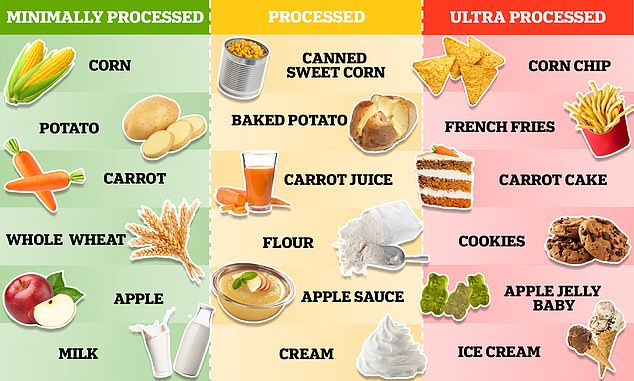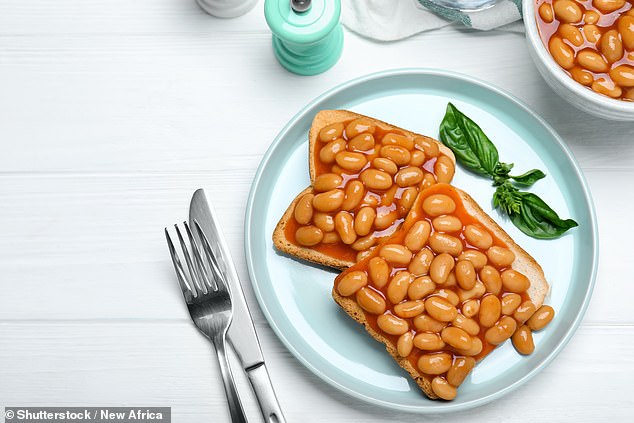EU health chiefs pull apart warnings about ultra-processed foods: studies warning of increased risk of heart attacks and strokes should be ‘considered with caution’
Eating too many ultra-processed foods that contain preservatives, sweeteners, and artificial colors can seriously damage your health, according to studies.
But experts say the term ultra-processed is “overused” and “not well explained,” causing confusion and concern.
This week campaigners warned that Britain is facing a ‘tidal wave of damage’ from the over-consumption of ultra-processed foods after research found it increases the risk of heart attacks and strokes.
However, the European Food Information Council warned that the data “should be considered with caution”.
It adds that “there is also an ongoing debate about the usefulness of the term ultra-processed when it comes to guiding consumers in their food choices.”
British dietitians have told MailOnline they want UK health chiefs to take similar action.
Experts warned Britain is facing a ‘tidal wave of damage’ from over-consumption of ultra-processed foods after two studies suggested it increases the risk of heart attacks and strokes. But dietitians argue that this classification causes confusion.
One of them, Dr Duane Mellor, said the recent hyperfocus on ultra-processed foods (UPFs) is not helping and UK health authorities should step in to clear up the confusion.
“They need to explain carefully and clearly that the term Ultra Processed Foods is getting a lot of attention right now, but it may be overused and not well explained,” he said.
While he recognized that the food industry needed to adopt processing methods that produced healthier foods, the panic over UPFs didn’t help.
“We need a food system that supports our health, but whether or not consumers care about UPF doesn’t address that problem,” he said.
He added that avoiding ultra-processed foods doesn’t help for some people, such as those with poor appetites or illnesses who need to consume nutritional supplements while they recover.
Instead, he suggested offering advice on what we should be eating more of, such as fruits, vegetables, nuts and seeds, which have consistently been shown to be associated with a reduced risk of heart disease.

Nutritionists divide foods into three groups based on the amount of processing they have undergone. Minimally processed foods, such as apples, are usually exactly as they occur in nature. Processed foods, such as applesauce, have undergone at least one processing process that has changed their original form. In contrast, ultra-processed foods, such as baby jelly babies, have undergone multiple levels of processing and are usually full of extra fats, dyes, and preservatives.

Instead of telling people to avoid all ultra-processed foods, such as mass-produced breads and baked beans, more advice should be given on what we should be eating more of, such as fruits, vegetables, nuts, and seeds.
Dr. Mellor also stressed that we need to understand what we’re eating so we don’t “unjustly demonize all food ingredients.”
While he admitted that sweeteners, for example, “may have a modest effect on how the body works,” they can be used as a way to reduce sugar intake, helping people avoid problems like obesity and diabetes.
Other chemicals used in ultra-processed foods, such as emulsifiers, can alter gut health.
Dr. Mellor said: ‘Emulsifiers are a wide variety of compounds, from synthetic compounds such as polysorbate-80, which has been linked to changes in gut health, to lecithin, which contains choline, which has been shown to be beneficial to the gut in some circumstances. health.
“We need an open conversation about additives and understand that of these effects.”
Another expert, Professor Gunter Kuhnle, thinks we don’t need a warning against ultra-processed foods, but wants to see more research.
The nutrition scientist, affiliated with the University of Reading, said there is currently no reason for people to worry about ultra-processed foods.
He explained that some ultra-processed foods, such as soft drinks, are associated with increased risks, but other foods, such as mass-produced whole-wheat bread, show a reduced risk of certain diseases.
He said: ‘Such a warning would do little but create uncertainty among consumers – there is already confusion over the distinction between processed and ultra-processed foods.
‘The additives have been assessed by many different authorities and found to be safe in the amount consumed.
“If there is any data that suggests otherwise and has not been reviewed, it should be sent to EFSA and the FSA for them to review.”
However, some doctors are calling for warning labels to be placed on ultra-processed foods because of the dangers this poses to our health.
Dr. Chris van Tulleken told MailOnline the new studies have reinforced calls for a warning labeling system in Britain to deter people from eating them.
